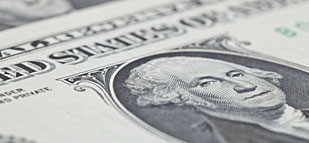
Stimulus programs such as the Fed's $65 billion in monthly bond purchases tend to weaken the dollar by driving down interest rates, which bolsters gold's appeal as a hedge.
In U.S. trading on Monday, EUR/USD was up 0.05% at 1.3742.
The dollar softened after the Conference Board reported that its consumer confidence index slipped to 78.1 in February from 79.4 in January, mainly due to concerns over general business conditions, jobs, and earnings.
Analysts were expecting the index to tick up to 80.0.
The present situation index rose to its highest level in almost six years, but the expectations index declined, indicating that while consumers believe the economy has improved they do not foresee further considerable improvement in the coming months.
Also on Tuesday, the Standard & Poor’s/Case-Shiller house price index rose 13.4% in December from a year earlier, the best December reading in eight years and slightly ahead of forecasts for a 13.3% gain.
Supporting the dollar somewhat were perceptions that powerful winter storms trekking across the country over the past month have bruised the economy and not a noteworthy decline in domestic demand, which should open the door to more robust economic indicators when the weather warms up.
Meanwhile in Europe, the European Commission revised up its growth forecast for the euro zone to 1.2% this year, up from 1.1% in November, which bolstered the euro.
However, the European Commission also cut its inflation forecast for 2014 to 1% from 1.5% in November, and warned that debt levels in several countries will continue to climb.
Earlier Tuesday, official data confirmed that Germany’s economy grew 0.4% in the fourth quarter and expanded 1.3% on a year-over-year basis, as strong overseas demand bolstered exports.
The dollar was down against the yen, with USD/JPY down 0.38% at 102.12, and down against the Swiss franc, with USD/CHF down 0.21% at 0.8870.
The greenback was down against the pound, with GBP/USD up 0.13% at 1.6676.
The pound saw support after data from the British Bankers Association showed that mortgage approvals rose 57% in January from a year earlier to 49,972, hitting a 76-month high.
A separate report by the Confederation of British Industry said U.K. retail sales rose at the fastest rate since June 2013 in February. The CBI distributive trades survey rose to 37 up from 14 in January, well ahead of forecasts for an uptick to 15.
The dollar was up against its cousins in Canada, Australia and New Zealand, with USD/CAD up 0.21% at 1.1085, AUD/USD down 0.23% at 0.9014 and NZD/USD down 0.11% at 0.8323.
The dollar index, which tracks the performance of the greenback versus a basket of six other major currencies, was down 0.09% at 80.17.
On Wednesday, the U.S. is to release data on new home sales, a leading indicator of demand in the housing market.
No comments:
Post a Comment